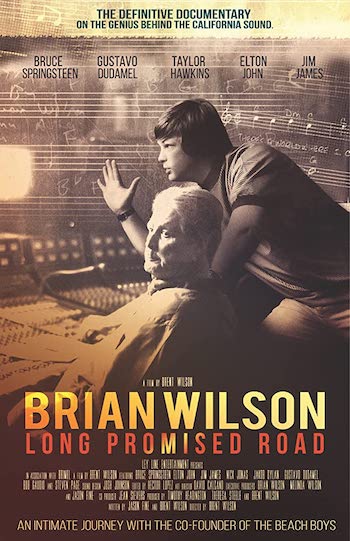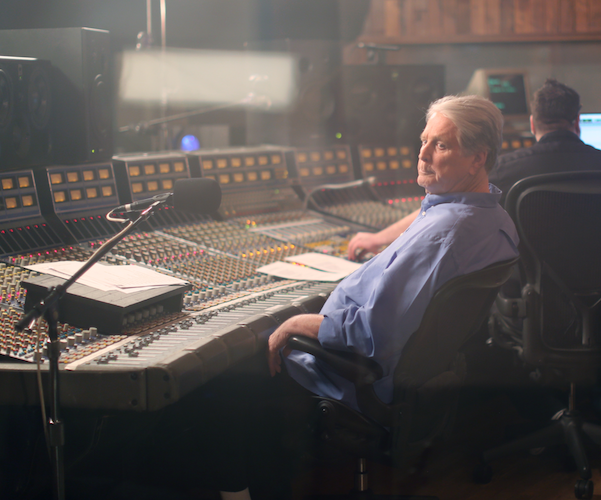Film Review: “Brian Wilson: Long Promised Road” — Getting Close to a Legend of Pop Music
By Jason M. Rubin
What comes across most clearly to the viewer is that every single day — practically every single hour — is a struggle for Brian Wilson.

Brian Wilson: Long Promised Road, a documentary about the pop music legend by filmmaker Brent Wilson (no relation) that debuts today at the Tribeca Film Festival in New York, is not the first one made about the Beach Boys founder. It’s not even the second. Brian was the focus of Don Was’s Emmy-nominated film I Just Wasn’t Made for These Times in 1995, was featured on an episode of AMC’s Biography series in 1999, and his life and career were essayed again in the 2004 film Beautiful Dreamer: Brian Wilson and the Story of Smile by Wilson insider David Leaf. Then there was the feature-length biopic Love & Mercy (Arts Fuse review) that was released in 2014. And that doesn’t even count the various documentaries and TV movies on the Beach Boys over the years.
Why the constant interest in Brian Wilson — someone who is happiest outside of the spotlight — as a subject for nonfiction filmmakers? Possibly because Wilson’s life and career are, as the saying goes, truly stranger than fiction. To say he is a multifaceted character doesn’t even touch the root of his story: he is, in fact, a mass of contradictions. An acknowledged musical genius with a chronic and pervasive mental illness, he is a giant bear of a man who shrinks from conflict and confrontation. One of the most famous and important people in the history of Los Angeles, he is the least “Hollywood” celebrity around (the man whom Don Was calls “one of the greatest artists who ever walked the earth” is excited that Vanna White is a neighbor). He stopped touring just four years into the Beach Boys’ career after suffering a panic attack but has been a tireless road warrior for the last two decades. Hell, it took two actors — Paul Dano and John Cusack — to play him in Love & Mercy.
As we learn from Long Promised Road, Wilson is scared almost all the time. His illness, schizoaffective disorder, means that he hears voices in his head that tell him threatening things, such as he’s going to die. This has been going on for him since he was 21 years old. On June 20 of this year, Wilson turns 79. That’s a long time for anyone to be dealing with such a harrowing condition. For someone as sensitive and fragile as Wilson often is, it’s nothing short of a miracle that he is still alive and capable of writing and performing music at a high level.
In the film, he rides with former Rolling Stone editor and close friend Jason Fine, visiting key sites from his life and career — such as his boyhood home (now razed but recognized with a plaque), the beach where the photo shoot for the first Beach Boys album cover was done (also marked with signage), and the house where Paul McCartney attended his one-time rival’s 34th birthday party in 1976. Wilson admits to feeling nervous getting out of the car at certain stops along the way, going into the studio for a rehearsal with his band, and even, hilariously enough, when he hears the Doobie Brothers’ hit song, “What a Fool Believes” (“Scares the hell out of me,” he says).
What comes across most clearly to the viewer is that every single day — practically every single hour — is a struggle for Brian Wilson. It takes every ounce of courage, every fiber of strength within him to get through a day. He seems happiest and most comfortable when he’s playing piano and when he’s eating. Nothing else comes easily for him, yet he maintains a productive and creative solo career, which includes 2004’s Grammy-winning Brian Wilson Presents SMiLE, the heroic completion of a work he abandoned in 1967 when the voices—both those inside his head and from confused fellow band members—became too much to bear.
This explains why Wilson is a notoriously bad interview. He simply isn’t comfortable being asked questions from people he doesn’t know and trust about things he either can’t remember or chooses not to recall. And yet Long Promised Road succeeds because of Fine’s gentle and assuring presence. The friendship between Fine and Wilson is not some fake industry connection; it’s very clear that Wilson loves and trusts Fine and it’s easy to see why: Fine relates to him with genuine kindness, empathy, and acceptance. He doesn’t want anything from Wilson. He doesn’t force any situations onto him. Fine offers support and friendship with no strings attached. He holds Wilson’s hand when he needs to be steadied, whether physically or emotionally. As a result, Wilson opens up to him in a way he does with few others.

A scene from Brian Wilson: Long Promised Road.
Which is not to say that Wilson — who is always keenly aware he is being filmed — suddenly becomes talkative and insightful. But Fine helps keep him on an even keel, which gives Wilson the confidence to momentarily show his true personality. One funny scene has the two riding around and admiring an antique Cadillac being driven in another lane. Wilson is curious what year model it is and asks Fine to yell out to the driver to find out. Fine demurs, saying he’s too far away. Unsatisfied, Wilson yells out to the driver through Fine’s window to ask for himself. (It was a 1941, the year before Wilson was born.)
As for the structure and substance of the film, there are the expected segments on his abusive father, Murry Wilson; his controversial and ultimately disgraced psychiatrist, Eugene Landy; and his late brothers and fellow Beach Boys, Dennis and Carl. Interestingly, Mike Love, the brash and litigious Beach Boys frontman who Brian’s most fervent fans love to hate, is not mentioned even once. The fifth original Beach Boy, Al Jardine, who continues to record and tour with Wilson to this day, appears as a talking head alongside numerous others spanning generations, from Elton John, Bruce Springsteen, and Bob Gaudio to Linda Perry, Taylor Hawkins, and Nick Jonas. A brand new song, “Right Where I Belong” — composed by Brian with lyrics supplied by My Morning Jacket’s Jim James — is featured in the film, along with a selection of performances from throughout Wilson’s 60-year career.
Director Wilson is still looking for a US distributor for the film. With luck, it will eventually screen in movie theaters and appear on streaming services and home video, hopefully with an accompanying soundtrack album. Until the general public gets to see this film, this writer’s recommendation as the mercury rises is to play Beach Boys albums like Endless Summer and Pet Sounds, or solo offerings such as Smile and That Lucky Old Sun, and marvel at the timelessness and depth of this miracle man’s magical music.
Jason M. Rubin has been a professional writer for more than 35 years, the last 20 as senior creative associate at Libretto Inc., a Boston-based strategic communications agency where he has won awards for his copywriting. He has written for Arts Fuse since 2012. Jason’s first novel, The Grave & The Gay, based on a 17th-centusy English folk ballad, was published in September 2012. His current book, Ancient Tales Newly Told, released in March 2019, includes an updated version of his first novel along with a new work of historical fiction, King of Kings, about King Solomon and the Queen of Sheba. Jason is a member of the New England Indie Authors Collective and holds a BA in Journalism from the University of Massachusetts Amherst.
Tagged: Brent Wilson, Brian Wilson, Brian Wilson: Long Promised Road, Jason M. Rubin

Great article on the genius Brian Wilson. His music and songs will live forever. By Gregg L. Friedman MD